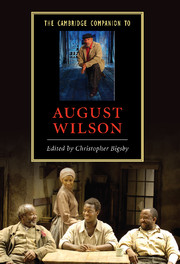Book contents
- Frontmatter
- 1 August Wilson: the ground on which he stood
- 2 Been here and gone
- 3 August Wilson’s relationship to black theatre: community, aesthetics, history and race
- 4 Music and mythology in August Wilson’s plays
- 5 Gem of the Ocean and the redemptive power of history
- 6 Joe Turner’s Come and Gone
- 7 Ma Rainey’s Black Bottom: cutting the historical record, dramatizing a blues CD
- 8 A piano and its history: family and transcending family
- 9 The tragedy of Seven Guitars
- 10 Safe at home?: August Wilson’s Fences
- 11 Two Trains Running: blood on the tracks
- 12 Jitney, folklore and responsibility
- 13 King Hedley II: in the midst of all this death
- 14 Radio Golf: the courage of his convictions - survival, success and spirituality
- 15 Critics on August Wilson
- 16 An interview with August Wilson
- Index
12 - Jitney, folklore and responsibility
Published online by Cambridge University Press: 28 January 2008
- Frontmatter
- 1 August Wilson: the ground on which he stood
- 2 Been here and gone
- 3 August Wilson’s relationship to black theatre: community, aesthetics, history and race
- 4 Music and mythology in August Wilson’s plays
- 5 Gem of the Ocean and the redemptive power of history
- 6 Joe Turner’s Come and Gone
- 7 Ma Rainey’s Black Bottom: cutting the historical record, dramatizing a blues CD
- 8 A piano and its history: family and transcending family
- 9 The tragedy of Seven Guitars
- 10 Safe at home?: August Wilson’s Fences
- 11 Two Trains Running: blood on the tracks
- 12 Jitney, folklore and responsibility
- 13 King Hedley II: in the midst of all this death
- 14 Radio Golf: the courage of his convictions - survival, success and spirituality
- 15 Critics on August Wilson
- 16 An interview with August Wilson
- Index
Summary
I simply wanted to show how the [jitney] station worked, how these guys created jobs for themselves and how it was organized . . . I just wanted to show these guys could be responsible.
August WilsonDespite being a well-known film star, Danny Glover found himself being shunned by New York City's taxicab drivers in the autumn of 1999. After finally being picked up by one cab driver, Glover experienced rude treatment. 'I was so angry,' he said in recounting the event to the New York Times. The Times reported that 'several empty cabs had refused to stop for him, his college-aged daughter and her roommate. Later, when one finally did, the driver refused the 6-foot-4 “Lethal Weapon” star access to the front seat even though he had a bad hip and is entitled under taxi industry rules to stretch out in front.' Glover filed a formal complaint with New York's Taxi and Limousine Commission; the incident received attention in the press; a protest rally was held in Harlem; and even New York's former Mayor David Dinkins added that he, too, had often been refused cab rides. Despite the public outrage, refusing cab rides to African Americans is a fact of urban life and a part of its folklore. In Public Enemy's Fear of a Black Planet, for example, the rap group compared the situation of taxicabs to police and fire fighters disregarding the black community during 9/11. The lyrics of one song report, '9/11 is a joke we don't want 'em / I call a cab 'cause a cab will come quicker.' To compensate, African Americans often use 'gypsy' cabs.
Known as jitneys, gypsy cabs constitute an underground industry in the African American community. At the beginning of the twentieth century, segregation was institutionalized; by mid-century it had become an embedded aspect of everyday life. Cut off from the mainstream socially and economically, blacks turned inwards for financial support.
- Type
- Chapter
- Information
- The Cambridge Companion to August Wilson , pp. 158 - 168Publisher: Cambridge University PressPrint publication year: 2007

